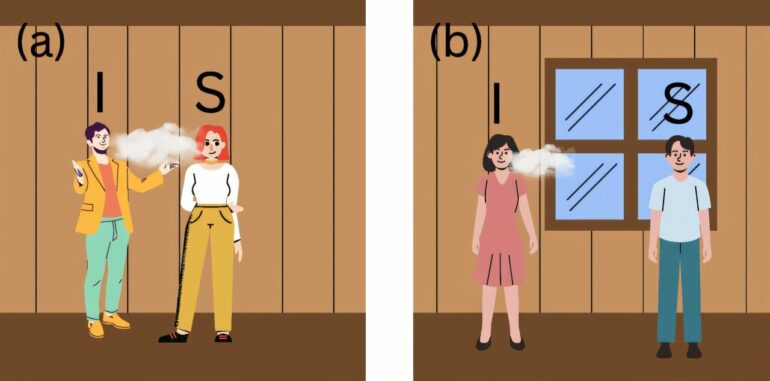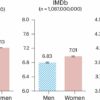Half a decade on from the start of the COVID-19 pandemic, a study by the University of Surrey highlights the significant impact of combined public health measures in reducing airborne viral transmission. High-quality face masks were shown to reduce transmission risk by ninefold, while doubling indoor air ventilation cut the risk by nearly a third, providing valuable insights to support future prevention strategies for respiratory diseases. The research is published in the journal Physical Review E.
In 2020, the world came to a near standstill as rising COVID-19 cases prompted unprecedented lockdowns, travel restrictions and widespread public health measures. The World Health Organization estimates that more than three million deaths were directly attributed to the virus during the first year of the outbreak, underscoring the devastating toll of the pandemic on global health and economies.
To better understand the dynamics of airborne transmission and inform future preparations, Dr. Richard Sear, Associate Professor at Surrey’s School of Mathematics and Physics, explored how the virus spreads during contact and the role of protective measures in reducing risk.
Dr. Sear said, “I’ve tried to measure how effective strategies, such as mask-wearing, are for the transmission of airborne viruses. This is both for any future pandemic, and for seasonal flu. I combined modeling with data from the UK’s NHS COVID-19 app. While these estimates are highly approximate, they provide guidance on the value of measures such as face masks, social distancing and improved indoor air quality, which could be tested in the future.”
Factors such as viral load, ventilation and individual susceptibility are likely to influence a significant variability in COVID-19 transmission rates, with some contacts posing a much higher risk than others. These findings highlight the importance of addressing environmental and behavioral factors in public health strategies.
In terms of personal protective equipment (PPE), high-quality face masks, such as N95/FFP2, were found to be particularly effective in reducing transmission risk, decreasing the effective reproduction number for COVID-19 transmission by a factor of approximately nine when worn by the entire UK population. Even individual use of N95 masks can lower transmission risk by threefold, no matter the duration of contact, whereas surgical and cloth masks are much less effective.
Ventilation also plays a critical role in controlling airborne transmission, as viral particles linger in poorly ventilated spaces, compounded by individual behaviors, such as close-contact interactions, speaking or coughing. By doubling the air turnover rate indoors, whether that’s through open windows and doors or increasing speed on air conditioning systems, transmission can be reduced by as much as 30%. Complementing good ventilation with physical distancing further minimizes the risk.
Dr. Sear added, “The COVID-19 pandemic was terrible for many of us, which is why it’s important that we learn from our experiences. It also demonstrated how quickly we can develop and roll out vaccines when faced with a global health crisis. Moving forward, both we as individuals and our leaders have an opportunity to apply these lessons to better control respiratory diseases—not only to head off any future pandemics, but to also manage seasonal diseases such as flu and RSV.”
More information:
Richard P. Sear, Estimating the population-level effects of nonpharmaceutical interventions when transmission rates of COVID-19 vary by orders of magnitude from one contact to another, Physical Review E (2024). DOI: 10.1103/PhysRevE.110.064302
Provided by
University of Surrey
Citation:
How prepared are we for another pandemic? Study provides mathematical insights into airborne viral transmission (2024, December 19)



